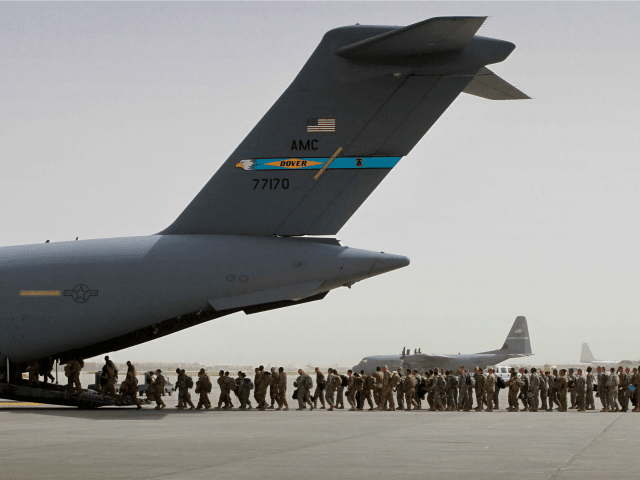The Pentagon is poised to discuss U.S. troop numbers in Afghanistan and how it will count the number of troops going forward, after years of non-transparency under previous administrations.
The Pentagon announced Wednesday morning that Pentagon Chief Spokesperson Dana W. White and Joint Staff Director Lt. Gen. Kenneth F. McKenzie Jr. would brief the media on “force management level accounting and reporting procedures in Afghanistan.”
The expected announcement on Wednesday could mark a huge change from the lack of transparency on troop numbers under the previous administrations.
The “force management level” is what the Pentagon has used for years to discuss the number of troops in Afghanistan. It only counts troops who are deployed on a full-time basis, or more than 120 days.
However, it did not count the hundreds, even thousands, more boots on the ground — simply because they were considered to be deployed on a “temporary basis.”
Currently, there are about 8,400 U.S. forces on the ground in Afghanistan — which the Pentagon has given out as the official count.
However, the real count is as many as 12,000, according to a recent report by the Wall Street Journal, who recently obtained the long-sought after “temporary” troop number.
Troops are also undercounted in Iraq and Syria, where there are officially 5,262 troops in Iraq and 503 in Syria, but in fact, hundreds more on the ground deployed on a temporary basis.
The practice of not counting temporary troops was a source of frustration for reporters under the Obama administration, which had set tightly-controlled troop caps but exceeded them with the temporary troops.
The Pentagon had announced early on in the Trump administration that it would look at how it counts troop numbers going forward, but the effort stalled after President Trump’s announcement of the Afghanistan policy last week.
After Trump said, “We will not talk about numbers of troops or our plans for further military activities,” there was a moratorium on giving out any troops numbers, even the official “force management level.”
“That’s the direction we’ve been given and that’s what we’re saying,” Pentagon spokesman Adam Stump had said on Thursday.
The transparency comes as the Pentagon is preparing to send as many as 3,900 U.S. forces to Afghanistan.
“There is no set number but [Defense Secretary Jim Mattis] now has the authority to deploy some additional forces if he sees fit,” a White House official told Breitbart.
Douglas L. Kriner, professor of political science at Boston University who has recently researched the human cost of the war, said it’s important to know how many American troops are deployed.
“I think it is important. It’s important because the costs of the war in Afghanistan have largely been hidden for most Americans. And as a result, I think public opinion on Afghanistan is very uncertain,” he said in a phone interview with Breitbart News on Tuesday.
“There’s just not a whole lot of information for most people have on which to base their beliefs about why we’re there, whether we should stay or go, and what the future course of the conduct should be,” he said. “A war-weary populace and media seems to have all but forgotten about this conflict.”
Kriner said both Republican and Democratic administrations in the past have pursued policies “of making it not all that easy to find out exactly how much the human sacrifice will be, and how much the financial sacrifice of the conflict is.”
Kriner’s research, along with co-researcher Francis X. Shen, found that states with high battlefield casualties may have played a major role in the 2016 elections, given Hillary Clinton’s foreign policy hawkishness, and Trump’s call to end the wars in Iraq and Afghanistan.
“These are Americans that have already suffered a lot. They’ve experienced war loss, they’re very patriotic and they’re willing to serve, but I think a lot of them have seen with some frustration firsthand, after 16 years, we have yet to achieve our objectives in Afghanistan, and they don’t look to be much closer than they did a decade ago,” he said.
“Maybe this means there are some strong electoral consequences should the administration go back on its word and double down in Afghanistan yet again, escalating our involvement there,” he added.

COMMENTS
Please let us know if you're having issues with commenting.